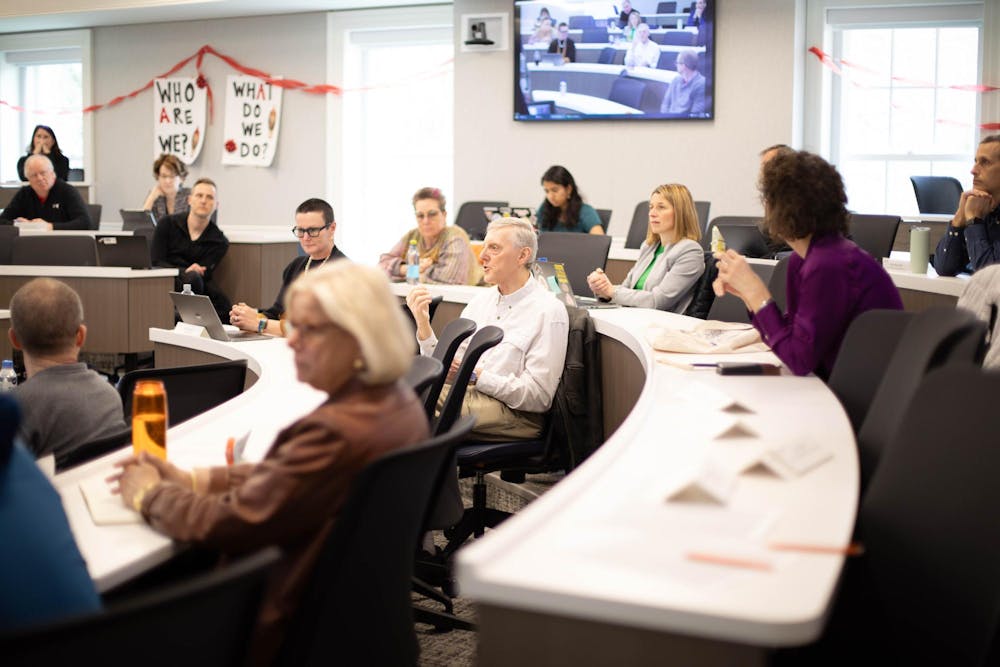A previous version of this article incorrectly stated that the FOIA request included listening sessions and was denied under presidential correspondence exemption. The request was for the submissions to the nomination form and was denied under confidential statements of recommendation and personnel information exemptions. The article has been updated to reflect these changes.
The Faculty Senate Executive Council sent a proposal via email to the Board of Visitors July 16 which included recommendations for the interim presidential search process. The Faculty Senate’s proposed interim search procedure outlined baseline characteristics for the candidate, steps for a nomination process and suggestions for the interim’s public announcement.
This proposal — which was obtained by The Cavalier Daily through an anonymous member of the Faculty Senate Executive Council — was developed by the Faculty Senate Executive Council and circulated to the full Senate for comment before being sent to the Board.
According to the anonymous member, the Faculty Senate received an email response from the Board expressing gratitude for the proposal, indicating that the proposal was received by the Board. No additional formal collaboration occurred between the two groups during the interim presidential selection process. A spokesperson for the University did not provide answers or a statement on the Faculty Senate’s claims.
In addition to the guiding characteristics the Faculty Senate set forth in its proposal, the proposal also included a four-week recommended plan of soliciting and evaluating candidates for the University’s interim president. Culminating in a three-phase recommended process, the proposal asked that the Board use guiding principles of “transparency, shared governance and independent decision making.”
The first two and a half weeks of the proposal made up phase one — a consultation and nomination period. Week one called for an official statement from the Board to announce the initiation of an interim search and call for nominations. Additionally, the proposal recommended that the Board continue to share updates with the community by communicating a public timeline, outline for interim appointment and interim search committee.
The second week of the Faculty Senate’s proposal called for the Board to host both University-wide and group-specific listening sessions via Zoom to solicit desired qualities in the next interim from faculty, staff and students.
The third and fourth weeks of the Faculty Senate’s proposal included candidate vetting, final selection and the official announcement of the interim president. The proposal recommends that the search committee conduct confidential interviews of narrowed down candidates and provide their thoughts independently to Rector Rachel Sheridan. However, the proposal also asked that for final selection, the Faculty Senate have the opportunity to provide feedback on the candidates before the Board makes a final decision regarding the appointment.
The University announced its appointment of Paul Mahoney, the former dean of the School of Law between 2008 and 2016, as the University’s interim president Aug. 4. Since Mahoney’s appointment, many groups, including the American Association of University Professors, United Campus Workers Union and Student Council have expressed discontent with the extent to which input from the community was considered by the Board in Mahoney’s selection.
Regarding the interim selection process, Faculty Senate Chair Jeri Seidman said that the Faculty Senate’s discontent with the Board stems from the lack of inclusion in the process by which Mahoney was selected as interim president. Nevertheless, Seidman still said that Mahoney fits the desired characteristics, including a terminal academic degree and a history of teaching and research, but she was still disappointed with the lack of collaboration.
“We asked for an interim president with demonstrated excellence and experience in leading roles, and Paul Mahoney is a former dean,” Seidman said. “The portions of the resolution … that were not acknowledged are primarily around the process. We called for a much more inclusive process than was undertaken.”
The Board did announce its initiation of the interim selection process and solicit nominations via an online form July 15. However, no further updates from the Board were shared with the community related to a public timeline of the selection process.
After the initiation of the process, the Board held group-specific listening sessions and synthesized key takeaways in the Aug. 4 Special Meeting of the Board presentation.
Details about how the nominations and listening sessions were integrated into the decision-making process remain unclear — though five individuals received 30 or more nominations from the public form, it is unclear if Mahoney was one of the five.
The Cavalier Daily submitted a Freedom of Information Act request for the results of submissions to the nomination form, but was denied under confidential statements of recommendation and personnel information exemptions.
According to Seidman, members of the Faculty Senate have felt excluded from the interim search process which has led to what she sees as gaps in the partnership between the Faculty Senate and the Board.
“We are not feeling like we have partners right now with the Board. We are continuing to advocate for faculty as well as for staff and students to the best of our ability, but this is a different position than we've found ourselves in recently,” Seidman said.
Despite this, Seidman said the Faculty Senate will continue to make efforts to collaborate with the Board. Sheridan and Vice Rector Porter Wilkinson were invited to attend the first full meeting of the Faculty Senate Friday to answer questions seeking details related to former University President Jim Ryan’s resignation as well as the interim and presidential selection processes. Although Mahoney attended this meeting, neither Sheridan nor Wilkinson were in attendance.







